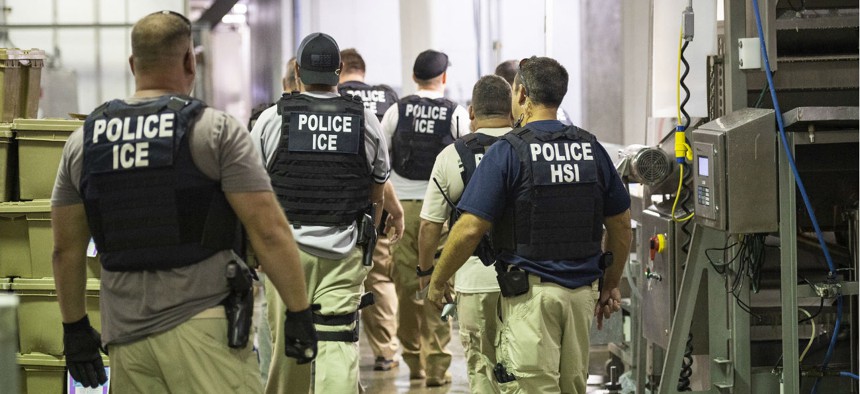
ICE agents conduct a worksite enforcement operation in Canton, Mississippi, in early August. ICE photo
ICE Employees: Don't Blame Us for 'Extreme Impact' of Our Work
Agency supervisors say politically motivated attacks on the Immigration and Customs Enforcement workforce are “unconscionable.”
Federal supervisors in charge of deporting undocumented immigrants have a message for their fellow citizens: do not blame us for the grief caused by our work.
In a “letter to the American public” last week, signed by field office directors at Immigration and Customs Enforcement’s Enforcement and Removal Operations, employees recognized that their work takes a heavy toll on families and often adds fuel to the immigration debate raging across the country. They added, however, much of that debate—as it involves the ICE workforce—is based on misconceptions and the improper assignment of blame. Employees themselves are aware of the “real and emotional” fallout of their work, the office directors said, but should not be subject to attacks from the public.
“The immediate and extreme impact an immigration enforcement action has on an individual and their family is not lost on our officers,” they wrote in their letter. “These ICE officers and their families live and shop, as well as attend schools and places of worship, in the same communities. Casting aspersions about our officers’ intentions only spreads fear in a community; this is unfair and without merit.”
The office directors specifically called out advocacy groups, citizens and politicians for sharing misleading information and misdirecting criticism toward ICE officers “who are charged with upholding laws Congress has passed.”
“Our officers do their jobs professionally, humanely, and treat those they encounter with dignity and respect,” they said, calling ideological attacks on ICE employees “unconscionable.” They added that employees know their work is “an extremely polarizing issue,” but they should not be castigated for enforcing the nation’s laws.
Bryan Cox, an ICE spokesman, said field officers cooridanted with headquarters in drafting the letter, but it was “prompted by repeated requests from field leadership.” Those employees “asked to clarify the record” due to what they viewed as misinformation and recent violence against ICE, Cox explained.
The letter noted two incidents in which an individual opened fire at an ICE facility, one in Tacoma, Washington, and the other in San Antonio. It also cited several examples of what the supervisors felt were incorrect allegations against ICE employees. The officers do not conduct “raids” or “sweeps,” the employees wrote, but instead make “targeted arrests.” The agency does routinely arrest undocumented immigrants identified in the course of other targeted actions, however.
The employees also clarified that they do not need a warrant to make an arrest and sought to dissuade anyone from attempting to interfere or obstruct them from carrying out their duties. Pushing back on recent reports that accused various components of the Trump administration of keeping detained immigrants in poor conditions, the employees also said ICE detention facilities offer better services and standards than “most local jails and prisons.” In a recent investigation, however, the Homeland Security Department’s inspector general found during surprise inspections conditions that violated agency standards and put detainees at risk. The investigations unveiled expired food, dilapidated bathrooms, nooses formed from sheets in cells, inadequate access to medical care and detainees subject to inhumane segregation and restraints, among other violations.
Spreading misinformation about ICE, the office directors said, could put employees at risk.
“These misconceptions may lead to violence, which places innocent bystanders, aliens and law enforcement officers in danger,” the officials said.







